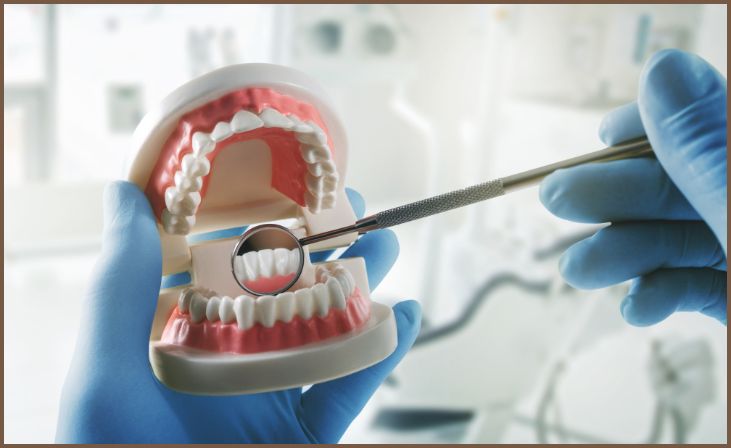Welcome to our insightful exploration of the link between oral health and overall wellness, where we uncover the profound connections that exist between a healthy mouth and a healthy body. Beyond just a bright smile, maintaining good oral hygiene is paramount for preserving overall well-being and preventing a myriad of systemic health issues.
In this comprehensive guide, we’ve gathered insights from experts in dentistry and healthcare to shed light on the intricate relationship between oral health and various aspects of wellness, including cardiovascular health, immune function, and mental well-being. From the role of inflammation in both oral and systemic diseases to the importance of regular dental check-ups in early disease detection, we’ll delve into the latest research and practical strategies for optimizing both oral and overall health.
The Link Between Oral Health and Overall Wellness: Insights from Experts
Understanding the Oral-Systemic Connection

Understanding the link between oral health and overall wellness is essential for promoting holistic health and well-being. Research has shown that oral health is closely connected to various systemic health conditions, including heart disease, diabetes, respiratory infections, and pregnancy complications. Poor oral health, such as gum disease and tooth decay, can contribute to inflammation and infection in the body, which may increase the risk of developing chronic diseases and exacerbate existing health conditions. Conversely, systemic health conditions such as diabetes and cardiovascular disease can also impact oral health and increase the risk of oral infections and diseases. By recognizing and addressing the oral-systemic connection, healthcare professionals can provide comprehensive care that addresses both oral and systemic health needs, leading to better overall health outcomes for patients.
Also Read: Navigating the Dental Visit: 9 Tips for a Positive Experience
Impact of Gum Disease on Systemic Health
Gum disease, also known as periodontal disease, is a chronic inflammatory condition affecting the gums and supporting structures of the teeth. Research has shown that untreated gum disease can have far-reaching effects on systemic health, increasing the risk of cardiovascular disease, diabetes, respiratory infections, and adverse pregnancy outcomes. The inflammatory process associated with gum disease can contribute to systemic inflammation and damage blood vessels, leading to atherosclerosis and an increased risk of heart attack and stroke. Additionally, gum disease has been linked to insulin resistance and poor glycemic control in individuals with diabetes, as well as an increased risk of respiratory infections and complications during pregnancy. By preventing and treating gum disease, healthcare professionals can help reduce the risk of systemic health problems and improve overall health outcomes for patients.
Oral Health and Heart Disease

The relationship between oral health and heart disease has been the subject of extensive research, with studies suggesting that poor oral health may increase the risk of developing cardiovascular disease. Gum disease, in particular, has been associated with an increased risk of heart attack, stroke, and atherosclerosis, the buildup of plaque in the arteries. The inflammatory process associated with gum disease can contribute to systemic inflammation and endothelial dysfunction, which can damage blood vessels and increase the risk of cardiovascular events. Additionally, oral bacteria from the mouth can enter the bloodstream and travel to the heart, where they may contribute to the formation of blood clots and arterial plaque. By maintaining good oral hygiene and addressing gum disease promptly, individuals can help reduce their risk of developing heart disease and protect their cardiovascular health.
Diabetes and Oral Health
The relationship between diabetes and oral health is bidirectional, with each condition influencing the other in a complex interplay. Individuals with diabetes are at an increased risk of developing gum disease due to impaired immune function, poor blood sugar control, and reduced saliva production. Conversely, untreated gum disease can make it more difficult for individuals with diabetes to control their blood sugar levels, leading to worsening glycemic control and an increased risk of diabetes complications. Poor oral health has also been linked to an increased risk of diabetic complications, including cardiovascular disease, kidney disease, and diabetic retinopathy. By maintaining good oral hygiene, monitoring blood sugar levels, and seeking prompt dental care, individuals with diabetes can help manage their condition and reduce their risk of oral and systemic health complications.
Respiratory Health and Oral Hygiene

The health of the respiratory system is closely linked to oral hygiene, with poor oral health increasing the risk of respiratory infections and complications. Oral bacteria from the mouth can be aspirated into the lungs, where they may contribute to the development of respiratory infections such as pneumonia and bronchitis. Individuals with poor oral hygiene, gum disease, or tooth decay are at an increased risk of respiratory infections due to the presence of bacteria and inflammation in the oral cavity. Additionally, certain respiratory conditions such as chronic obstructive pulmonary disease (COPD) and asthma may be exacerbated by poor oral health, as inflammation and infection in the mouth can trigger or worsen respiratory symptoms. By practicing good oral hygiene and seeking regular dental care, individuals can help reduce their risk of respiratory infections and support overall respiratory health.
Pregnancy Complications and Oral Health
Pregnancy complications can be influenced by oral health, highlighting the importance of maintaining good oral hygiene during pregnancy. Pregnant individuals may be at an increased risk of developing gum disease due to hormonal changes, increased blood flow to the gums, and potential alterations in immune function. Untreated gum disease during pregnancy has been associated with adverse pregnancy outcomes, including preterm birth, low birth weight, and preeclampsia. Additionally, oral infections and inflammation may increase systemic inflammation and the risk of pregnancy complications. Therefore, maintaining optimal oral health through regular dental checkups, proper oral hygiene practices, and timely treatment of dental issues is essential for supporting a healthy pregnancy and reducing the risk of adverse outcomes for both the mother and baby.
Impact of Medications on Oral Health
Certain medications used to treat systemic health conditions can have implications for oral health, highlighting the importance of medication management and dental care coordination. Some medications, such as antihypertensive drugs, antidepressants, and anticoagulants, can cause side effects such as dry mouth, gum overgrowth, and increased risk of bleeding, which may affect oral health and dental treatment outcomes. Additionally, medications that reduce saliva flow or alter the composition of saliva can increase the risk of tooth decay, gum disease, and oral infections. Healthcare professionals, including dentists and physicians, should collaborate to assess the potential impact of medications on oral health, identify individuals at risk of medication-related oral health issues, and develop strategies to mitigate risks and optimize oral health outcomes for patients.
Oral Health Promotion and Disease Prevention

Promoting oral health and preventing dental disease are essential components of overall health and wellness. Adopting healthy lifestyle habits such as brushing and flossing regularly, eating a balanced diet, avoiding tobacco use, and seeking regular dental checkups can help maintain optimal oral health and reduce the risk of dental problems. Additionally, educating individuals about the importance of oral hygiene, preventive dental care, and the link between oral health and systemic health can empower them to take control of their oral health and make informed decisions about their dental care. By prioritizing oral health promotion and disease prevention efforts, healthcare professionals can help individuals achieve and maintain healthy smiles for life.
Integrating Oral Health into Primary Care
Integrating oral health into primary care settings is crucial for addressing the oral health needs of individuals and promoting comprehensive healthcare delivery. Primary care providers, including physicians, nurse practitioners, and physician assistants, play a vital role in screening for oral health issues, providing oral health education, and referring patients to dental professionals for preventive and therapeutic interventions. By incorporating oral health assessments, screenings, and preventive services into routine primary care visits, healthcare providers can identify oral health problems early on, intervene promptly, and support patients in achieving optimal oral health outcomes. Collaborative care models that involve coordination between medical and dental professionals can help bridge the gap between oral health and overall health and improve access to comprehensive care for patients.
Community-Based Oral Health Programs

Community-based oral health programs play a critical role in expanding access to dental care, promoting oral health awareness, and addressing oral health disparities among underserved populations. These programs may include school-based dental sealant programs, community health fairs, mobile dental clinics, and outreach initiatives targeting vulnerable populations such as children, seniors, and individuals with limited access to dental care. By bringing dental services directly to communities and partnering with local organizations and stakeholders, community-based oral health programs can reach individuals who may otherwise face barriers to accessing dental care. Additionally, these programs play a crucial role in promoting oral health education, providing preventive services, and connecting individuals with resources to support their oral health needs.
Conclusion
In conclusion, the intimate relationship between oral health and overall wellness underscores the importance of prioritizing dental care as an integral part of a healthy lifestyle. By recognizing the interconnectedness of oral health with systemic health conditions, we can take proactive steps to safeguard our well-being and enhance our quality of life. From maintaining good oral hygiene practices to seeking regular dental care and staying informed about the latest research, investing in our oral health pays dividends in promoting a happier, healthier existence. Let’s embrace the synergy between oral health and overall wellness and strive towards achieving optimal health in every aspect of our lives.
FAQs
How does poor oral health affect overall wellness?
Poor oral health, characterized by gum disease, tooth decay, and oral infections, can contribute to systemic health issues such as cardiovascular disease, diabetes, and respiratory infections due to the spread of bacteria and inflammation.
What are some practical tips for maintaining good oral health and overall wellness?
To promote both oral health and overall wellness, it’s essential to practice daily oral hygiene habits such as brushing and flossing, eat a balanced diet rich in nutrients, limit sugary foods and beverages, avoid tobacco use, and schedule regular dental check-ups and cleanings.
